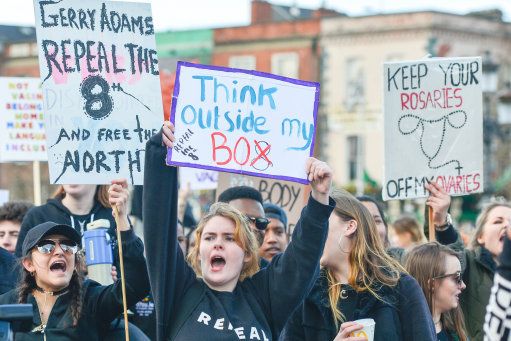There’s a video that, if you move in certain circles, you might have seen online. In it, a group of women walk along a pristine West London street, each with a wheely suitcase. Their faces are serious, and many of them wear a black jumper with the word “REPEAL” written in white. They’re heading to the Irish Embassy.
If you were to slow the video down and count, you’d find that there are 77 of them: the same number of Irish women who, on average, travel to Britain every week to procure an abortion.
Carry out a straw poll on a London street like this one, and you’ll find plenty of people aren’t aware of Ireland’s abortion laws. Until recently, even some feminist activists were surprised to learn about the 8thamendment: the clause in the Irish constitution that makes the life of a foetus equal to that of the woman carrying it (in one recent case, a woman and her foetus were actually represented by separate legal teams).
Under Irish law, abortion is illegal even in cases of rape or incest, although since 2013 it has been permitted if a woman’s life is at risk. In practice, if a woman wishes to procure an abortion, she has three options: obtain illegal abortion pills and risk prosecution; attempt an abortion at home; or, if she can get together the money, travel to Britain, to pay for an abortion there.
It is this last group of women that the suitcase protest, organised by the Coalition to Repeal the 8thAmendment, was designed to highlight. The affecting video is just one action in a sustained campaign by different groups, across the Republic and overseas. The famous REPEAL jumpers are another, with activists seen sitting behind Taoiseach Leo Varadkar at a recent speech on Brexit.
Women like Irish Times writer Roisin Ingle and Helen Linehan—wife of the Irish comedian, Graham Linehan—have written about their own experiences. Earlier this year, following a similar action in Poland, a “#Strike4Repeal” action shut down Dublin city centre.
If English feminists used to be in the dark about Ireland’s abortion laws, Irish activists have switched the light on—permanently.
"On average, 77 Irish women travel to Britain every week to procure an abortion"More important, however, is the effect back home. This week, after several years’ sustained campaigning, Varadkar has announced that there will be a 2018 referendum on the 8th amendment. The announcement follows a consultative Citizen’s Assembly on the subject in April, described by some activists as a stalling tactic. The Assembly recommended that the 8th be amended. Women’s activists hope that the terms of the referendum, which are as yet unclear, will allow the result to go further.
“We must remain focused on ensuring the 8th amendment is repealed, not replaced, so that Ireland complies with international human rights law and standards,” said one activist from the X-ile Project, an awareness campaign named after the famous “X case” which saw the European Court of Human Rights find Ireland in breach of Europe’s human rights convention after a 14-year-old girl and victim of statutory rape sought an abortion in Britain. “Most people in Ireland are in favour of changing our restrictive abortion laws—we believe that this will be reflected in a majority vote to repeal the 8th amendment.”
Activists, however, are careful to stress that they have some way to go before they convince the country to vote for repealing, rather than replacing, the law, although there is now widespread support for changing it in some way. (“In a way, Leo [Varadkar] will be the perfect litmus test,” one left-wing commentator joked to me earlier this year, “as you know he won’t call a referendum until he thinks it’ll be popular.”)
The Abortion Rights Campaign say they “cautiously welcome” the announcement, also stressing the need to repeal the 8th rather than amend it: “The current situation is unsustainable, but replacing it may lead to little or no improvement if the new amendment includes discriminatory restrictions.”
Recently, abortion rights activists have added a fourth word to the old “free, safe, legal” maxim used to describe their demands for abortion access: “local.” If next year’s referendum goes their way, they might finally get it.












